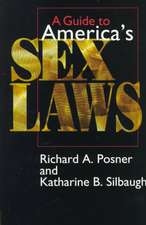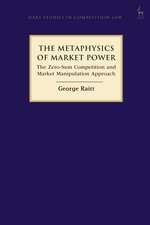Antitrust Law, Second Edition
Autor Richard A. Posneren Limba Engleză Paperback – 22 aug 2019
When it was first published a quarter of a century ago, Richard Posner's exposition and defense of an economic approach to antitrust law was a jeremiad against the intellectual disarray that then characterized the field. As other perspectives on antitrust law have fallen away, Posner's book has played a major role in transforming the field of antitrust law into a body of economically rational principles largely in accord with the ideas set forth in the first edition. Today's antitrust professionals may disagree on specific practices and rules, but most litigators, prosecutors, judges, and scholars agree that the primary goal of antitrust laws should be to promote economic welfare, and that economic theory should be used to determine how well business practices conform to that goal.
In this thoroughly revised edition, Posner explains the economic approach to new generations of lawyers and students. He updates and amplifies his approach as it applies to the developments, both legal and economic, in the antitrust field since 1976. The "new economy," for example, has presented a host of difficult antitrust questions, and in an entirely new chapter, Posner explains how the economic approach can be applied to new industries such as software manufacturers, Internet service providers, and those that provide communications equipment and services.
"The antitrust laws are here to stay," Posner writes, "and the practical question is how to administer them better-more rationally, more accurately, more expeditiously, more efficiently." This fully revised classic will continue to be the standard work in the field.
In this thoroughly revised edition, Posner explains the economic approach to new generations of lawyers and students. He updates and amplifies his approach as it applies to the developments, both legal and economic, in the antitrust field since 1976. The "new economy," for example, has presented a host of difficult antitrust questions, and in an entirely new chapter, Posner explains how the economic approach can be applied to new industries such as software manufacturers, Internet service providers, and those that provide communications equipment and services.
"The antitrust laws are here to stay," Posner writes, "and the practical question is how to administer them better-more rationally, more accurately, more expeditiously, more efficiently." This fully revised classic will continue to be the standard work in the field.
| Toate formatele și edițiile | Preț | Express |
|---|---|---|
| Paperback (1) | 238.74 lei 3-5 săpt. | +18.64 lei 6-10 zile |
| University of Chicago Press – 22 aug 2019 | 238.74 lei 3-5 săpt. | +18.64 lei 6-10 zile |
| Hardback (1) | 442.26 lei 6-8 săpt. | |
| University of Chicago Press – 4 dec 2001 | 442.26 lei 6-8 săpt. |
Preț: 238.74 lei
Nou
Puncte Express: 358
Preț estimativ în valută:
45.68€ • 47.13$ • 38.12£
45.68€ • 47.13$ • 38.12£
Carte disponibilă
Livrare economică 05-19 martie
Livrare express 18-22 februarie pentru 28.63 lei
Preluare comenzi: 021 569.72.76
Specificații
ISBN-13: 9780226684130
ISBN-10: 022668413X
Pagini: 304
Dimensiuni: 152 x 229 x 25 mm
Greutate: 0.49 kg
Ediția:Second Edition
Editura: University of Chicago Press
Colecția University of Chicago Press
ISBN-10: 022668413X
Pagini: 304
Dimensiuni: 152 x 229 x 25 mm
Greutate: 0.49 kg
Ediția:Second Edition
Editura: University of Chicago Press
Colecția University of Chicago Press
Notă biografică
Richard A. Posner is a judge of the US Court of Appeals for the Seventh Circuit and a senior lecturer in law at the University of Chicago Law School. His many books on the application of economics to law include Economic Analysis of Law, now in its fifth edition.
Cuprins
Preface
Introduction
Part One: Setting the Stage
1. The Costs—and Occasionally the Benefits—of Monopoly
2. An Overview of the Antitrust Laws
Part Two: Collusion
3. Price Fixing and the Oligopoly Problem
4. Breaking Up Large Firms
5. Horizontal Mergers, Potential Competition, and Market Definition
6. Two Problems of Collusion
Part Three: Exclusionary Practices
7. Exclusionary Practices (I)
8. Exclusionary Practices (II): The New Economy
Part Four: Administering Antitrust Law
9. Toward the Simplification of Antitrust Doctrine
10. The Problem of Enforcement
Appendix: An Introduction to the Formal Analysis of Monopoly
Index
Introduction
Part One: Setting the Stage
1. The Costs—and Occasionally the Benefits—of Monopoly
2. An Overview of the Antitrust Laws
Part Two: Collusion
3. Price Fixing and the Oligopoly Problem
4. Breaking Up Large Firms
5. Horizontal Mergers, Potential Competition, and Market Definition
6. Two Problems of Collusion
Part Three: Exclusionary Practices
7. Exclusionary Practices (I)
8. Exclusionary Practices (II): The New Economy
Part Four: Administering Antitrust Law
9. Toward the Simplification of Antitrust Doctrine
10. The Problem of Enforcement
Appendix: An Introduction to the Formal Analysis of Monopoly
Index





















